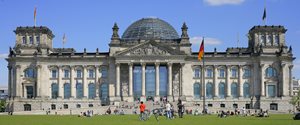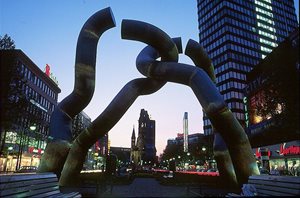
For students looking to discover the beautiful country of Germany, coupled with a work experience that infuses classroom learning with practical application, this internship offers that and so much more. Through two substantial partnerships, students have the opportunity to actively participate in research and projects related to EU politics and integration. Additionally, as a continental hub, living and working in Berlin has proven to be an extremely beneficial experience to former interns. Read on to learn more about this amazing opportunity.

Living in Berlin
With a population of 3.5 million, Berlin is Germany’s largest city - and a city that is unlike any in the world. Thanks to its position geographically, and politically during the Cold War, Berlin now enjoys an amazing atmosphere that is extremely affordable, diverse, and international. In fact, on a single train ride, one might hear a handful of languages!
Berlin is made up of over 20 kiez (city neighborhoods), which are relatively small communities within towns. No need to fret about getting around the city, however, as Berlin is home to a tremendous public transportation system. In a matter of days interns will be riding around the city, practicing their German with the locals. Living and working in this city affords the opportunity to meet people from every corner of the globe - it is truly a window to not just Europe, but the entire world.
Guides to Living in Berlin
U.S. Embassy’s Guide to Living in Germany: Check out this guide (made for Americans!) to living in Germany – from social expectations to travel and security information, this website provides a good glimpse into German culture.
Lonely Planet’s – Top Things to do in Berlin: From seeing the sights and dining at popular restaurants, to shopping and entertainment, Berlin has a wide variety of activities that can be added to anyone’s bucket list.
Frommer’s Guide to Berlin’s Neighborhoods: Learn about Berlin’s neighborhoods, each of which has a distinct atmosphere, architectural style, and culture.
14 Good Reasons to Visit Germany: 14 great attractions to see or experience while in Germany, including a multitude of different festivals, cities, and activities that are a worth the trip.
Working in Berlin
Through internships with the Centre international de formation européenne (CIFE), PPIP interns have the opportunity to actively participate in research and projects related to EU politics and integration. CIFE is located in the Berlin neighborhood of Wilmersdorf - twenty minutes from the city center by metro.
CIFE ( Centre international de formation européenne), which is loosely translated as the “International Centre for European Training,” is an international program that was created in 1954 as a way to introduce professionals and citizens to the newly united Europe. Over the past 60 years, CIFE has become a highly respected and prestigious, world renowned program that is recognized and supported by the European Union. CIFE offers postgraduate courses, summer university programs, general education through seminars and apprenticeships, and various publications.
While described by former PPIP interns as a relatively “laid back” working environment, CIFE staff take their work seriously and interns are expected to produce quality work that supports their mission of contributing to the discourse on Europe’s future.
Typical Intern Duties
Students interning at CIFE often work under individual researchers, completing tasks that enable the full-time employees to do their work. Instead, interns are often asked to be flexible and lend a hand wherever it is needed. Depending on the day of the week, CIFE interns may be the only native English speaker in the office, and thus are relied upon for a multitude of projects. Typical intern responsibilities include, but are not limited to:
- Identifying academic articles for various purposes, often for use by the researchers or the directors.
- Maintaining and updating websites and newsletters.
- Assisting with planning international workshops and conferences.
- Editing publications for grammar and readability.
- Translating text from German to English. The Lingua France of European civic society is English, therefore most of the literature is translated to English.
